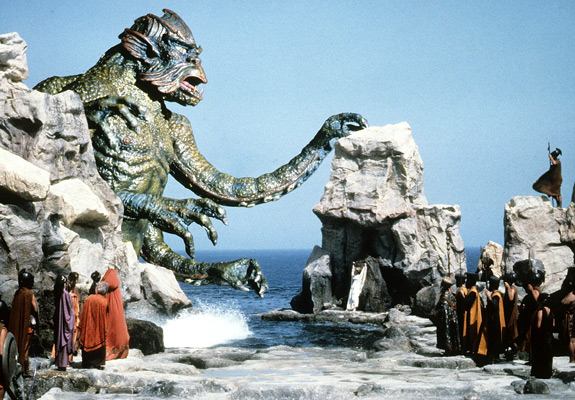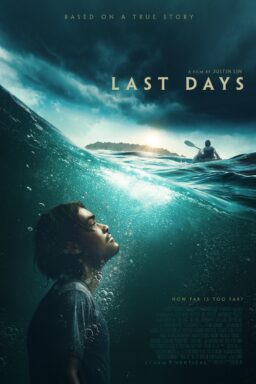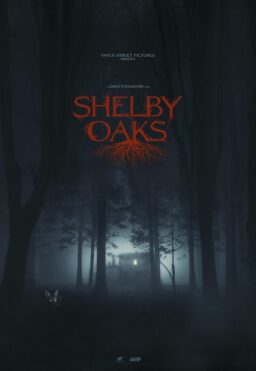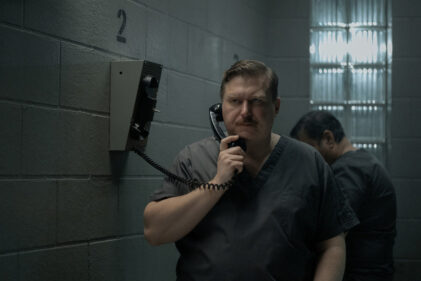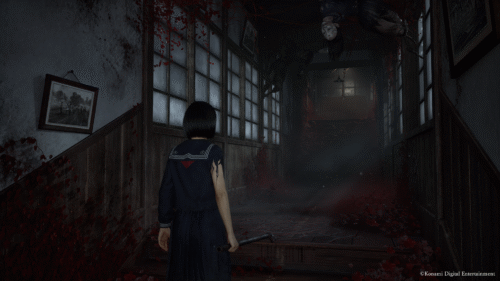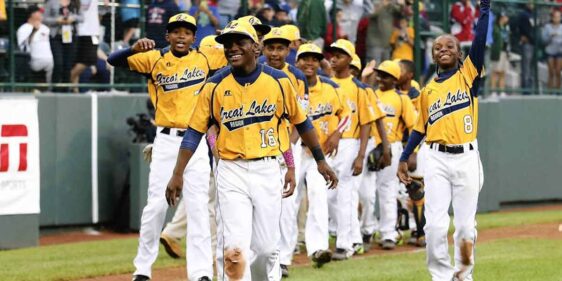“Clash of the Titans” is a grand and glorious romantic adventure, filled with grave heroes, beautiful heroines, fearsome monsters, and awe-inspiring duels to the death. It is a lot of fun. It was quite possibly intended as a sort of Greek mythological retread of “Star Wars” (it has a wise little mechanical owl in it who’s a third cousin of R2-D2), but it’s also part of an older Hollywood tradition of special-effects fantasies, and its visual wonderments are astonishing.
The story, on the other hand, is robust and straightforward. Perseus (Harry Hamlin) is locked into a coffin with his mother and cast into the sea, after she has angered the gods. But Zeus (Laurence Olivier) takes pity and sees that the coffin washes ashore on a deserted island, where Perseus grows to manhood and learns of his mission in life. The mission, in a nutshell, is to return to Joppa and rescue Andromeda (Judi Bowker) from a fate worse than death: marriage to the hideously ugly Calibos, who was promised her hand in marriage before he was turned into a monster by the wrath of the gods. Calibos lives in a swamp and dispatches a gigantic, scrawny bird every night to fetch him the spirit of the sleeping Andromeda in a gilded cage. If Perseus is to marry Andromeda, he must defeat Calibos in combat and also answer a riddle posed by Cassiopeia, Andromeda’s mother. Those who answer the riddle incorrectly are condemned to die. Love was more complicated in the old days.
There are, of course, other tests. To follow the bird back to the lair of Calibos, the resourceful Perseus must capture and tame Pegasus, the last of the great winged horses. He must also enter the lair of Medusa, who turns men to stone with one glance, and behead her so that he can use her dead eyes to petrify the gargantuan monster Kraken, who is unchained from his cage on the ocean floor so that he can ravish Joppa in general and Andromeda in particular.
All of this is gloriously silly. But because the movie respects its material, it even succeeds in halfway selling us this story; movies that look like “Clash of the Titans” have a tendency to seem ridiculous, but this film has the courage of its convictions. It is also blessed with a cast that somehow finds its way past all the monsters and through all the heroic dialogue and gets us involved in the characters. Harry Hamlin is a completely satisfactory Perseus, handsome and solemn and charged with his own mission. Judi Bowker is a beautiful princess and a great screamer, especially in the scene where she’s chained to the rock and Kraken is slobbering all over her. Burgess Meredith has a nice little supporting role as Ammon, an old playwright who thinks he may be able to turn all of this into a quick epic. And Laurence Olivier is just as I have always imagined Zeus: petulant, but a pushover for a pretty face.
The real star of the movie, however, is Ray Harryhausen, who has worked more than forty years as a creator of special effects. He uses combinations of animation, miniatures, optical tricks, and multiple images to put humans into the same movie frames as the most fantastical creatures of legend, and more often than not, they look pretty convincing: when Perseus tames Pegasus, it sure looks like he’s dealing with a real horse (except for the wings, of course).
Harryhausen’s credits include “Mighty Joe Young,” “Jason and the Argonauts” and “The Golden Voyage of Sinbad,” but “Clash of the Titans” is his masterwork. Among his inspired set-pieces: the battle in the Medusa’s lair, with her hair writhing with snakes; the flying-horse scenes; the gigantic prehistoric bird; the two-headed wolf-dog, Dioskilos; the Stygian witches; and, of course, Kraken, who rears up from the sea and causes tidal waves that do a lot of very convincing damage to a Greek city that exists only in Harryhausen’s art. The most lovable special-effects creation in the movie is little Bubo, a golden owl sent by the gods to help Perseus in his trials. Bubo whistles and rotates his head something like R2-D2 in “Star Wars,” and he has a similar personality, too, especially at the hilarious moment when he enters the film for the first time.
“Clash of the Titans” is a family film (there’s nothing in it that would disturb any but the most impressionable children), and yet it’s not by any means innocuous: It’s got blood and thunder and lots of gory details, all presented with enormous gusto and style. It has faith in a story-telling tradition that sometimes seems almost forgotten, a tradition depending upon legends and myths, magical swords, enchanted shields, invisibility helmets, and the overwhelming power of a kiss.

